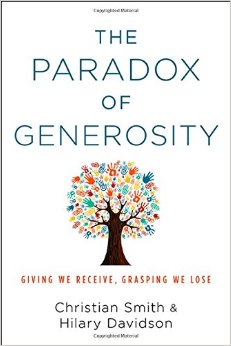As a Mormon, I’ve sat through a fair number of lessons and talks that can be boiled down to a single, facile message: “Pay your tithing and be blessed!”
Sometimes they make me uncomfortable. Mormon lessons can get pretty creative and transactional with interpreting Malachi 3:10, promising that Heavenly Father will take care of the material needs of anyone who commits to a full 10 percent.
Which is not actually what that scripture assures us will happen, I retort inwardly. (I rarely say these things out loud in church. That’s why I have a blog, see.)
Despite my quibbles about our money claims, I have been faithfully giving 10% of my income to charity since college, even before I was a Mormon. I may feel uncomfortable by superficial talks and lessons that focus on the material blessings that arise from generosity, but . . . I’ve also never missed any money I’ve given away, or wished I had it back.
If anything, my experience has been that tithing has made me a little more spiritual, a little more loving, a little less greedy than I would be without it as a regular spiritual discipline.* And I’ve never wanted for anything financially, not really, unless you count the TARDIS I keep asking for each Christmas to no avail, or possibly that pony.
So I particularly resonate with the sociological findings of the new book Paradox of Generosity: Giving We Receive, Grasping We Lose, releasing this week from Oxford. Christian Smith and Hilary Davidson have attempted a rigorous, five-year scientific investigation into generosity.
It turns out my anecdotal experience is borne out by actual data. Some statistics from the book:
- Four in ten people who are full tithe-payers say they are very happy and have a strong purpose in life, compared with 28% among those who don’t tithe.
- Generous people are more likely to be interested in personal growth, have stronger relational connections, and avoid symptoms of depression than non-givers.
- 50% of people in the “most generous” category say they are in excellent or very good health, compared with 20% for the least generous.**
So you’d think, given the chance to be happier and healthier, we’d all be reaching for the checkbook each pay period, right? That we’d want to selfishly boost our own welfare, to say nothing of the altruism of doing a little good in the world?
 According to the book, only 2.7% of Americans pay a full 10% tithe (even though a whopping 20% claim they do). As the authors put it, “the vast majority of Americans (97%) are forfeiting their chance to enhance their well-being by practicing real generosity with their money.”
According to the book, only 2.7% of Americans pay a full 10% tithe (even though a whopping 20% claim they do). As the authors put it, “the vast majority of Americans (97%) are forfeiting their chance to enhance their well-being by practicing real generosity with their money.”
Six out of seven people don’t even give away as much as 2%, the authors said this week on PBS.com. Nearly half give nothing away at all, not a single dollar.
Among Mormons, obviously, the tithing figure is much higher than 2.7%, making me wonder how low the overall national figure might go if Mormons were taken out of the mix. A very conservative estimate would be that a quarter of U.S. Mormons are full tithe-payers, with a recent non-random Pew study suggesting it might even be as high as 65%. (See here for details.)
Let’s split the difference and imagine that 40% of American Mormons are actually full tithe-payers, roughly in line with sociologist Armand Mauss’s notion that it’s somewhere around a third. That’s far from total compliance with our own religious ideals but a darn sight better than the 2.7% national average.
I’m glad that Mormons as a people emphasize generosity and sacrifice, that we think the spiritual discipline of tithing is important.
And even though we mangle Malachi by attributing to it all kinds of claims about the “window of blessings” being the wealth, health, and happiness that will be rained down on tithe-payers, those Sunday School teachers can now cite another kind of expertise to prove their point: The Paradox of Generosity.
Greater personal happiness may not be the best motivation for tithing, which Mormons believe is a commandment, but it certainly doesn’t hurt.
Never miss a Flunking Sainthood blog post. Sign up in the box at top right to receive an email alert about any new content.
* I do have issues with the lack of financial accountability in the LDS Church, as I’ve addressed in another post. ** Note that this is self-reported based on how the respondents said they felt, not their actual medical diagnoses.






